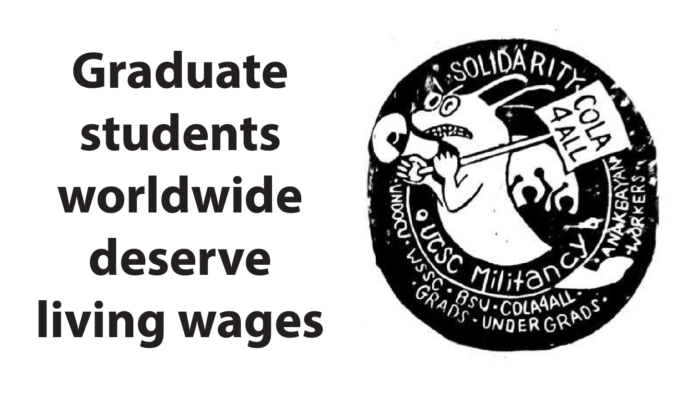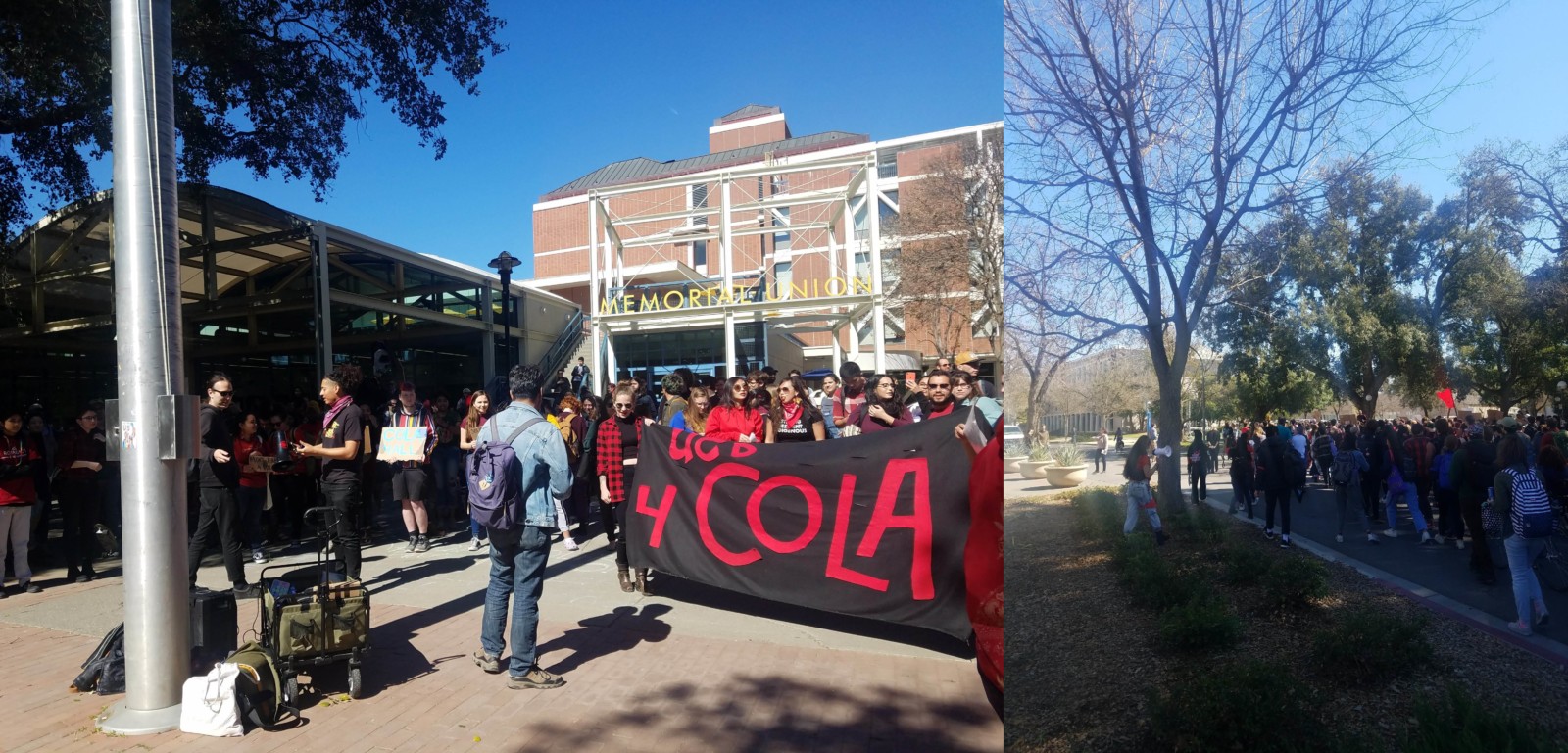
‘Now, more than ever, we need science’, thinks the editor of this blogpost as he works from his small studio paid by a rent-burdened academic salary while under lockdown in California due to the COVID-19 pandemic. However, the need for an open, fair, inclusive science seems to be ignored all across the world by policy makers and university administrations, who refuse to pay graduate students living wages and bully the ones who dare to stand up for it. This week, Emilia Hernandez, Graduate Student in the Department of Earth and Planetary Sciences, University of California, Davis, writes about the on-going Cost of Living Adjustment movement at University of California, its origins, and why it is a fight for the future of science.
We as earth scientists see the Earth as a set of interconnected systems with a shared history. Human interactions are no different – we share a common set of circumstances created by a shared history. The legacy of slavery, colonialism, and patriarchy are perpetuated by an economic and political system that not just leads to, but also promotes, a society with deeply unequal distribution of wealth and power.

Emilia Hernandez, Graduate Student in the Department of Earth and Planetary Sciences, University of California, Davis, USA.
The history of science reflects this as well — Charles Darwin’s expeditions would not have been possible without the imperial strength of the British Navy, and women have been largely left out of academia until relatively recently. The result of these historical wrongs is that historically disadvantaged groups are less likely to have the economic resources to pursue higher education.
Therefore, a large part of remedying injustice involves paying graduate (masters and PhD) students a living wage so that the financial burden of graduate school does not fall disproportionately on disadvantaged groups. In the United States, grad students often pay for their graduate education as Teaching Assistants (TAs), meaning that they are responsible for teaching classes in addition to their research duties. Both of these are essential functions of the university; therefore, they are workers whose right to fair compensation has and keeps being won by a strong labor movement. The campaign for a Cost of Living Adjustment (COLA) at the University of California is one attempt to make the mission of the university more responsive to student needs through labor action.
TAs, readers, and associate instructors at the University of California are unionized with the United Auto Workers. Contract negotiations in 2018 gave these Academic Student Employees (ASEs) a 3% yearly pay raise. However, this does not keep up with the rate of inflation in California, which may be up to 4% a year in certain metropolitan areas.
This contract was rejected by 83% of union members at UC Santa Cruz, which is among the most cost-burdened schools in the UC system. From 2015 to 2017, rent rose by 15% in Santa Cruz. By 2018, the average grad student was being paid USD$73 less than the average cost of a 1 bedroom apartment in the area. Additionally, 70% of grad students at Santa Cruz pay more than 30% of their income in rent and 25% spend more than 70% of their income on rent, meaning that a significant fraction of the graduate student population is rent-burdened or severely rent burdened. These economic pressures are felt more severely by student parents, disabled students, and international students who are prohibited by their visas to pursue outside employment.
These conditions of economic precarity combined with existing tensions over the contract between union leadership and rank-and-file members led to grad students organizing a wildcat grading strike (meaning a strike without union leadership’s authorization) that began on December 9th, 2019. This labor stoppage in which ASEs would withhold final grades for all students except those who needed grades for graduation or financial aid.
When the university refused to meet with striking grad students and sent disciplinary notices to striking grad students on February 5th, grad students at Santa Cruz voted for a full strike that began on February 10th.
However, the University of California, led by former director of Department of Homeland Security Janet Napolitano, retaliated against striking grad students. During the first week of the strike, police from all over the state were called in to a cost of at least $300,000 a day and arrested 17 people on the picket line on the third day of the strike. Repression also occurred through administrative channels. Through Executive Vice Provost Lori Kletzer, on February 14th she threatened to fire striking students who did not submit grades by end of day February 21. Students at Santa Cruz shut down the campus and threw a “Doomsday Party”, while that week demonstrations of solidarity with calls to spread the strike were held at UC Davis, UC Santa Barbara, UC Berkeley, UC Irvine, UC Merced, UC San Diego, and UC Los Angeles — all but one of the UC campuses.

Rally for Cost Of Living Adjustment on March 2 at University of California, Davis. Credit: Emilia Hernandez
When this deadline passed and no students were fired, the deadline was increased to February 27. On February 28, 54 striking grad students received notification of termination and about 20 more were not hired for spring quarter. Without the funding from a TA position, these students may not be able to continue their graduate education.
However, the entire University of California community has rallied in support and solidarity with strikers at Santa Cruz. Solidarity rallies that have escalated to strikes for a COLA have spread to other UC campuses, across which 78% of all grad students are rent-burdened. At the time of writing (March 10), six campuses — UC Santa Barbara, UC Davis, UC Berkeley, UC San Diego, and UC Los Angeles — have committed to some form of labor stoppage in support of a Cost of Living Adjustment.
The University of California is the largest employer in the sixth largest economy in the world. Once a symbol of academic freedom and economic mobility, years of state budget cuts have resulted in tuition increases for undergraduates and reduced compensation for University workers, while salaries for administrators have ballooned. This transfer of resources from students and workers to highly paid executives coupled with its harsh strike-breaking tactics have turned the UC’s direction to be profit-motivated and as harsh as the worst corporations.
Unfortunately, the conditions just described for the University of California are present across academia. As a result, the same labor organizing and response to imposed hardships by local institutions are happening worldwide. University staff and members of the University College Union, which represents academics, lecturers, trainers, researchers and academic-related staff working across the United Kingdom, announced a 14 day strike against years of decline of pay value. Additionally, students in France are on strike for a change in admission criteria that will affect underrepresented students.
Grad students in the Earth Sciences study and understand how processes across the globe are inter-linked and recognize the importance of this international struggle for graduate student compensation. At UC Santa Cruz, 28 Earth and Planetary Science grad students have publicly pledged to not accept TA positions at Santa Cruz in solidarity with fired grad student strikers. Earth Science grad students across the UC system (including this author!) have been organizing for a COLA. The Earth Science community’s commitment to diversity, equity, and inclusion as well as our tendency to think systematically has led to our strong showing among the STEM community that supports COLA and a better future for scientists and science
A COLA will lead to more diverse perspectives in science. For example, people from certain regions that have not been historically represented in the global geology community will have a different perspective on those regions than those of us who are (sometimes unwelcome) visitors. Additionally, international students are particularly vulnerable in American institutions, as they cannot get outside jobs if their funding falls short. Nevertheless, they risk deportation because the high cost of living has made graduate school increasingly untenable. Disabled students have higher medical costs, which are exacerbated by the lack of a public option for health insurance in the US. Finally, grad students are increasingly unable to consider having children, as the cost of childcare combined with rent has risen too much. All of these factors limit participation of disadvantaged groups.
In order to study the Earth, we have to think globally. Incorporating more researchers from different parts of the world, minorities, and underrepresented parts of society should be a part of the Earth science we see for the future.
Further reading: Whitepaper on how graduate student stipends have changed through time: https://uc-cola.herokuapp.com/ Official website of UC Santa Cruz wildcat strikers: https://payusmoreucsc.com/ "In the UC Santa Cruz Wildcat Strike, Class War Meets the California Housing Crisis": https://www.motherjones.com/politics/2020/02/in-the-uc-santa-cruz-wildcat-strike-class-war-meets-the-california-housing-crisis/ "Become Unreasonable" -- article written by COLA organizers at UCSC: https://communemag.com/become-unreasonable/



